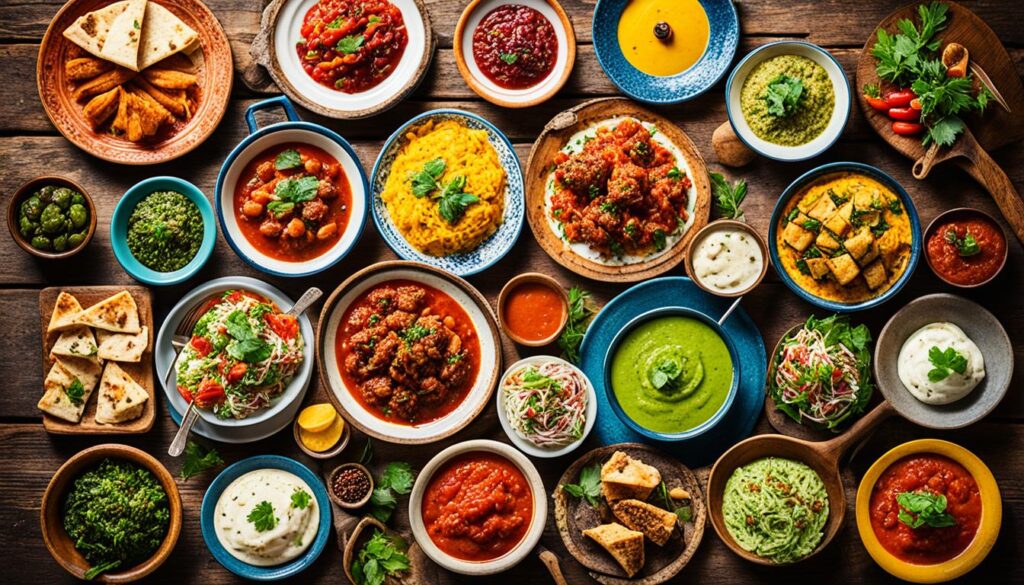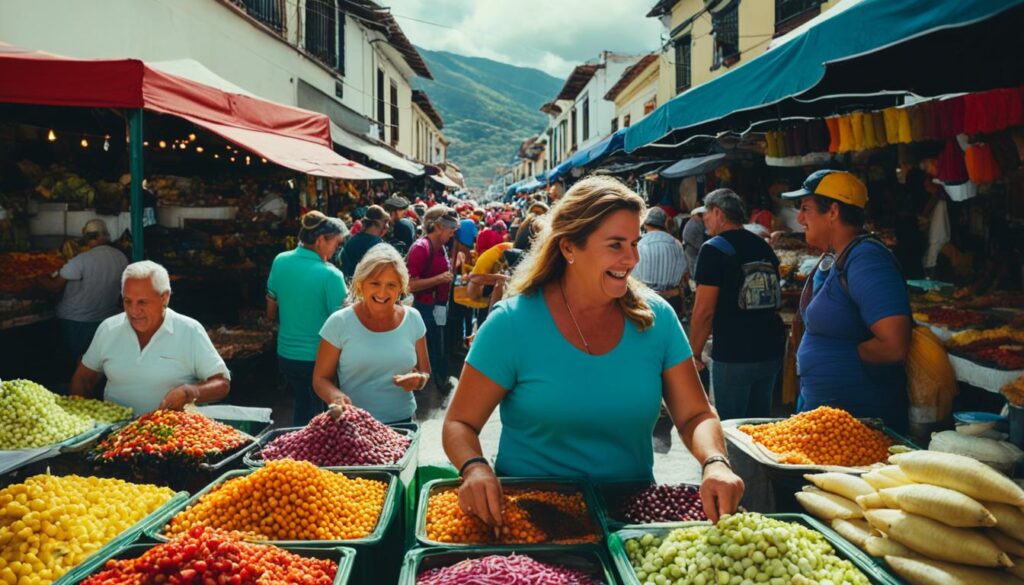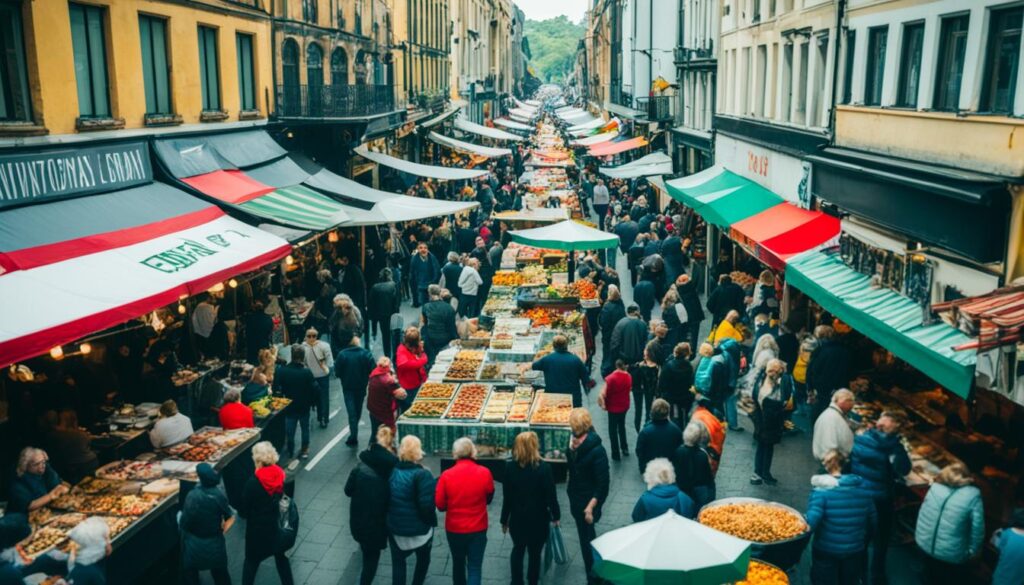Food tourism, also known as culinary tourism or gastronomy tourism, is a popular trend in the travel industry. It involves traveling to different destinations to explore and experience the local cuisine, food culture, and traditions. Food tourists are not just looking for a meal but for the full experience of learning about the history, culture, and people behind the food. This trend has been driven by the growing interest in food and cooking, as well as the desire for authentic travel experiences. Food tourism offers opportunities for businesses to showcase local culinary specialties and attract tourists. It also benefits destinations by supporting local economies, promoting sustainable tourism, and preserving culinary traditions.
Key Takeaways:
- The rise of food tourism has revolutionized the travel industry.
- Food tourism involves exploring cuisines, cultures, and traditions in different destinations.
- Authentic travel experiences and the growing interest in food have contributed to the popularity of food tourism.
- Food tourism benefits businesses by showcasing local culinary specialties and supporting local economies.
- Food tourism promotes sustainable tourism practices and helps preserve culinary traditions.
The Benefits of Culinary Tourism
Culinary tourism, also known as food tourism, has become a popular trend in the travel industry. It allows travelers to not only explore new destinations but also immerse themselves in the local food culture, creating unforgettable memories and experiences. Culinary tourism offers a plethora of benefits for both travelers and destinations.
Exploring a New Culture Through Food
One of the greatest advantages of culinary tourism is the opportunity to connect with a destination’s culture through its food. By sampling local dishes and drinks, travelers can embark on a gastronomic journey that reflects the history, traditions, and heritage of the place they are visiting. Food acts as a gateway to understanding the local way of life and serves as a medium for cultural exchange. Whether it’s savoring traditional street food or indulging in fine dining, culinary tourism allows travelers to gain a deeper understanding and appreciation of a destination’s unique identity.
Supporting Local Economies
Culinary tourism plays a vital role in supporting local economies. When travelers choose to dine in local restaurants and purchase food products from local vendors, they contribute directly to the growth and sustainability of the community. By patronizing these establishments, culinary tourists help create employment opportunities and generate income for local residents. This economic boost not only benefits the food industry but also extends to other sectors such as agriculture, hospitality, and transportation.
Promoting Sustainable Agriculture
One of the emerging trends in culinary tourism is the focus on promoting sustainable agriculture. Many food tourists seek out farm-to-table experiences where restaurants prioritize locally sourced and seasonal ingredients. This not only ensures freshness and quality but also supports sustainable agricultural practices. By choosing to consume locally grown produce, culinary tourists contribute to the preservation of traditional farming methods, reduce their environmental impact, and promote the overall well-being of the planet.
Creating New Opportunities
The rise of food tourism has sparked the development of various products and services specifically tailored for food enthusiasts. From food tours and cooking classes to wine tastings and food festivals, travelers now have a plethora of options to explore a destination’s culinary offerings. These experiences allow them to engage with local chefs, artisans, and culinary experts, gaining insights and skills that they can carry back home. Through these new opportunities, culinary tourism has fostered a sense of curiosity and adventure among travelers, elevating their overall experience.

In conclusion, culinary tourism offers a myriad of benefits for travelers and destinations alike. It allows travelers to delve into a new culture through its food, supports local economies and sustainable agriculture, and creates unique opportunities for exploration and discovery. As the global foodie culture continues to flourish, food tourism trends are expected to evolve, providing even more exciting foodie vacation destinations for travelers to indulge their culinary desires.
Trends in Culinary Tourism
Culinary tourism has become increasingly popular in recent years, with travelers seeking unique gastronomic experiences during their trips. One particular demographic driving this trend is millennials, who have shown a strong interest in food while traveling and are willing to invest in unforgettable dining experiences.
Millennials prioritize food culture and use modern technology, such as food-focused apps and websites, to plan and customize their culinary adventures. With just a few taps, they can explore trending food destinations, locate hidden gems, and make reservations at highly sought-after restaurants.
Social media also plays a pivotal role in fueling the growth of culinary tourism. Influencers and food bloggers share captivating visuals and engaging narratives about their dining experiences, exposing consumers to new cuisines and enticing foodie destinations. Through platforms like Instagram and YouTube, travelers can explore a global culinary landscape at the touch of their fingertips.
These trends have paved the way for numerous opportunities within the culinary tourism industry. Businesses now have the chance to cater to the demands of food tourists by offering unique culinary experiences, such as farm-to-table dining, food festivals, cooking classes, and immersive food tours.
Culinary tourism is no longer merely about eating; it has evolved into a multi-sensory journey that combines culture, history, and exploration. By embracing these trends, both travelers and businesses can fully immerse themselves in the world of food and create unforgettable culinary memories.
Ecuador: A Rising Culinary Destination
While many destinations are known for their culinary offerings, Ecuador is an emerging culinary destination that should not be overlooked. Ecuadorian cuisine reflects the country’s rich cultural diversity, influenced by indigenous, African, and Spanish traditions. Iconic dishes such as ceviche, locro, and churrasco highlight the unique flavors and ingredients of Ecuadorian cuisine. The country’s diverse ecosystems, from the high Andes to the Amazon rainforest and the Pacific coast, contribute to the variety of culinary traditions and ingredients found in Ecuador. Travelers can indulge in street food, exotic fruits, and beverages while immersing themselves in the vibrant culinary culture of the country.

Must-Try Ecuadorian Dishes
If you’re planning a foodie vacation to Ecuador, be sure to try these mouthwatering dishes:
| Dish | Description |
|---|---|
| Ceviche | A refreshing seafood dish made with marinated raw fish or seafood, lemon or lime juice, onions, tomatoes, and herbs. |
| Locro | A hearty potato soup made with cheese, avocado, corn, and other ingredients, often served with crispy fried pork. |
| Churrasco | A grilled steak dish served with rice, beans, fried plantains, and a fried egg on top. |
These are just a few examples of Ecuador’s culinary delights. The country also offers a wide variety of street food, including empanadas, tamales, and llapingachos (potato pancakes stuffed with cheese). And don’t forget to sample the exotic fruits and beverages unique to the region.
Food Travel Tips for Exploring Ecuador
- Visit local markets: Ecuador’s markets are a treasure trove of fresh produce, spices, and local delicacies. Explore markets like Mercado Central in Quito or Mercado Artesanal in Otavalo to experience the vibrant food culture.
- Take a cooking class: Learn how to prepare traditional Ecuadorian dishes and gain insights into local culinary techniques. Cooking classes offer a hands-on experience and a deeper understanding of the local cuisine.
- Try street food: Street food vendors in Ecuador offer a wide variety of delicious and affordable options. From empanadas to roasted corn, be adventurous and try the street food specialties.
- Engage with locals: Locals are often proud of their culinary heritage and are happy to share their food recommendations. Strike up a conversation and ask for insider tips on the best places to eat.
Explore the rich flavors and culinary traditions of Ecuador’s diverse regions. From the Andes to the coast, each area offers a unique culinary experience that will delight food lovers.
Ecuador is truly a rising star in the world of culinary tourism. Its vibrant food culture, unique ingredients, and diverse culinary traditions make it a foodie vacation destination not to be missed. Whether you’re savoring ceviche by the coast or enjoying hearty locro in the Andes, Ecuador has something to offer every food lover.
Conclusion
Food tourism is on the rise, offering travelers unparalleled opportunities to immerse themselves in the culture and heritage of a destination through its gastronomy. This growing trend not only benefits travelers but also supports local economies, promotes sustainable tourism practices, and helps preserve culinary traditions.
With its diverse culinary traditions and unique ingredients, Ecuador is emerging as a must-visit destination for food enthusiasts. Travelers can indulge in a wide range of culinary experiences, from exploring street food markets to savoring exotic fruits and beverages. Ecuador showcases the country’s rich cultural diversity, blending indigenous, African, and Spanish influences into iconic dishes that highlight the flavors and ingredients unique to this vibrant culinary culture.
As we navigate the post-pandemic era and look towards the recovery of the tourism industry, culinary tourism holds immense potential. Food tourism trends, such as the increasing interest in authentic travel experiences and the use of technology to plan customized trips, continue to enhance the growth of this trend globally. As destinations like Ecuador embrace the rise of food tourism, they contribute to the revival of the tourism industry and provide food lovers with unforgettable experiences.
So, if you are a food enthusiast seeking a memorable vacation, consider embarking on a culinary journey and discover the magic of foodie destinations around the world. Whether you are indulging in the culture of Ecuador, exploring the culinary secrets of renowned capitals, or venturing off the beaten path to uncover hidden gems, culinary travel promises to tantalize your taste buds, broaden your horizons, and allow you to savor the essence of each destination.
















